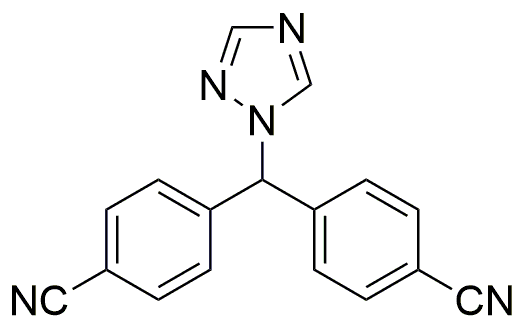Letrozole is widely utilized in research focused on:
- Breast Cancer Treatment: Primarily used as an aromatase inhibitor in hormone receptor-positive breast cancer, helping to lower estrogen levels and slow tumor growth.
- Fertility Treatments: Employed in ovulation induction for women with polycystic ovary syndrome (PCOS), offering a less invasive alternative to traditional fertility drugs.
- Research on Hormonal Therapies: Used in studies to explore the effects of estrogen suppression on various cancers, providing insights into treatment efficacy and patient outcomes.
- Endocrinology Studies: Helps researchers understand the role of hormones in metabolic processes, contributing to advancements in diabetes and obesity research.
- Veterinary Medicine: Investigated for its potential in treating hormone-dependent conditions in animals, showcasing its versatility beyond human applications.
General Information
Properties
Safety and Regulations
Applications
Letrozole is widely utilized in research focused on:
- Breast Cancer Treatment: Primarily used as an aromatase inhibitor in hormone receptor-positive breast cancer, helping to lower estrogen levels and slow tumor growth.
- Fertility Treatments: Employed in ovulation induction for women with polycystic ovary syndrome (PCOS), offering a less invasive alternative to traditional fertility drugs.
- Research on Hormonal Therapies: Used in studies to explore the effects of estrogen suppression on various cancers, providing insights into treatment efficacy and patient outcomes.
- Endocrinology Studies: Helps researchers understand the role of hormones in metabolic processes, contributing to advancements in diabetes and obesity research.
- Veterinary Medicine: Investigated for its potential in treating hormone-dependent conditions in animals, showcasing its versatility beyond human applications.
Documents
Safety Data Sheets (SDS)
The SDS provides comprehensive safety information on handling, storage, and disposal of the product.
Product Specification (PS)
The PS provides a comprehensive breakdown of the product’s properties, including chemical composition, physical state, purity, and storage requirements. It also details acceptable quality ranges and the product's intended applications.
Certificates of Analysis (COA)
Search for Certificates of Analysis (COA) by entering the products Lot Number. Lot and Batch Numbers can be found on a product’s label following the words ‘Lot’ or ‘Batch’.
Numéro de catalogue
Numéro de lot/série
Certificates Of Origin (COO)
This COO confirms the country where the product was manufactured, and also details the materials and components used in it and whether it is derived from natural, synthetic, or other specific sources. This certificate may be required for customs, trade, and regulatory compliance.
Numéro de catalogue
Numéro de lot/série
Safety Data Sheets (SDS)
The SDS provides comprehensive safety information on handling, storage, and disposal of the product.
DownloadProduct Specification (PS)
The PS provides a comprehensive breakdown of the product’s properties, including chemical composition, physical state, purity, and storage requirements. It also details acceptable quality ranges and the product's intended applications.
DownloadCertificates of Analysis (COA)
Search for Certificates of Analysis (COA) by entering the products Lot Number. Lot and Batch Numbers can be found on a product’s label following the words ‘Lot’ or ‘Batch’.
Numéro de catalogue
Numéro de lot/série
Certificates Of Origin (COO)
This COO confirms the country where the product was manufactured, and also details the materials and components used in it and whether it is derived from natural, synthetic, or other specific sources. This certificate may be required for customs, trade, and regulatory compliance.


